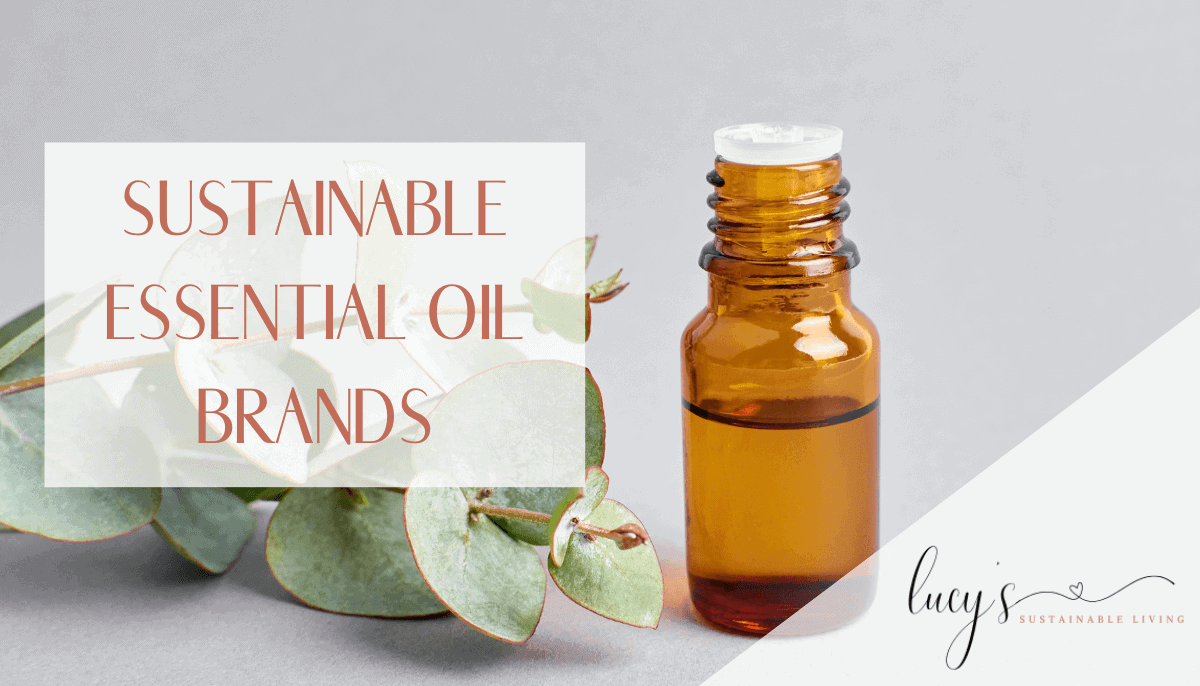Can’t live without your diffuser’s hum and that lavender-scented home, but worried about your eco-impact?
Dab some lavender oil on your temples and worry no more!
Eco-consciousness meets aromatic luxury thanks to these sustainable essential oil brands!
9 Sustainable Essential Oil Brands Redefining Aromatherapy
1. Neal’s Yard Remedies
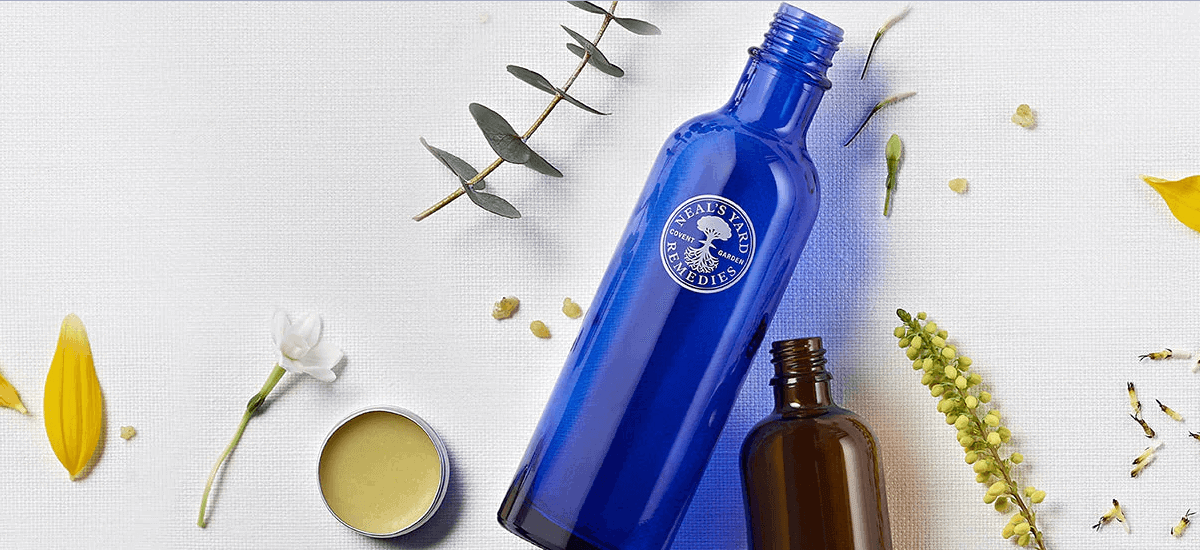
A pioneer in ethical and sustainable beauty, Neal’s Yard Remedies sets high standards with 92% certified organic ingredients and a CarbonNeutral® certification.
Notable for its renewable energy-powered eco-factory and commitment to sustainable packaging, the brand is a leader in environmental stewardship and ethical practices, including cruelty-free standards and community support in Serbia.
- Sourcing and Ingredients: 92% certified organic ingredients; avoids GM ingredients; ethically sourced rosehips from Serbia.
- Production and Manufacturing: Uses renewable energy, including solar panels; CarbonNeutral® certified; Science Based Targets for emission reduction.
- Packaging and Distribution: Utilizes 100% recycled plastic and glass bottles; UK-sourced materials; aims for recycled bottles by 2025.
- Corporate Responsibility: First health and beauty brand with 100/100 ethics score by the Ethical Company Organisation; Leaping Bunny approved.
- Certifications: Soil Association certified; CarbonNeutral®; Leaping Bunny program adherence.
2. Vitruvi
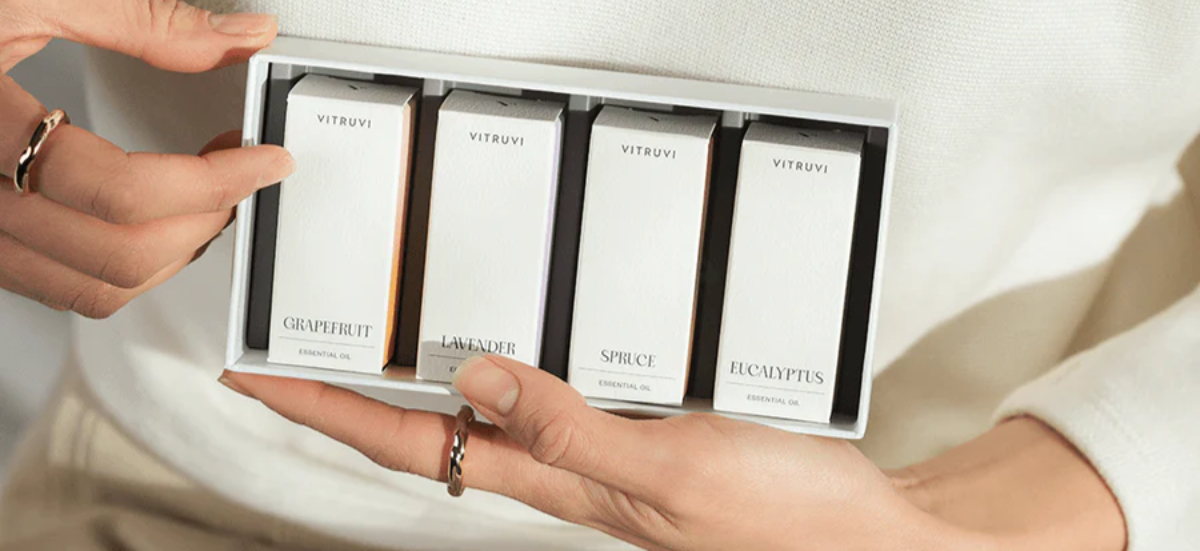
Vitruvi combines the art of fragrance with a commitment to cultural preservation and wellness. With their 100% natural, vegan, and cruelty-free essential oils sourced globally, and efforts in supporting sustainable farming and community health programs, Vitruvi represents a harmonious blend of quality, ethics, and environmental consciousness.
- Sourcing and Ingredients: Global sourcing; 100% natural, vegan, cruelty-free; EU and Sephora clean standards.
- Production and Manufacturing: Recycled glass bottles; recyclable packaging.
- Packaging and Distribution: Efficient design to reduce waste.
- Corporate Responsibility: Donations to sustainable farming and community health programs.
- Certifications: Leaping Bunny certified; cruelty-free and vegan focus.
3. Mountain Rose Herbs
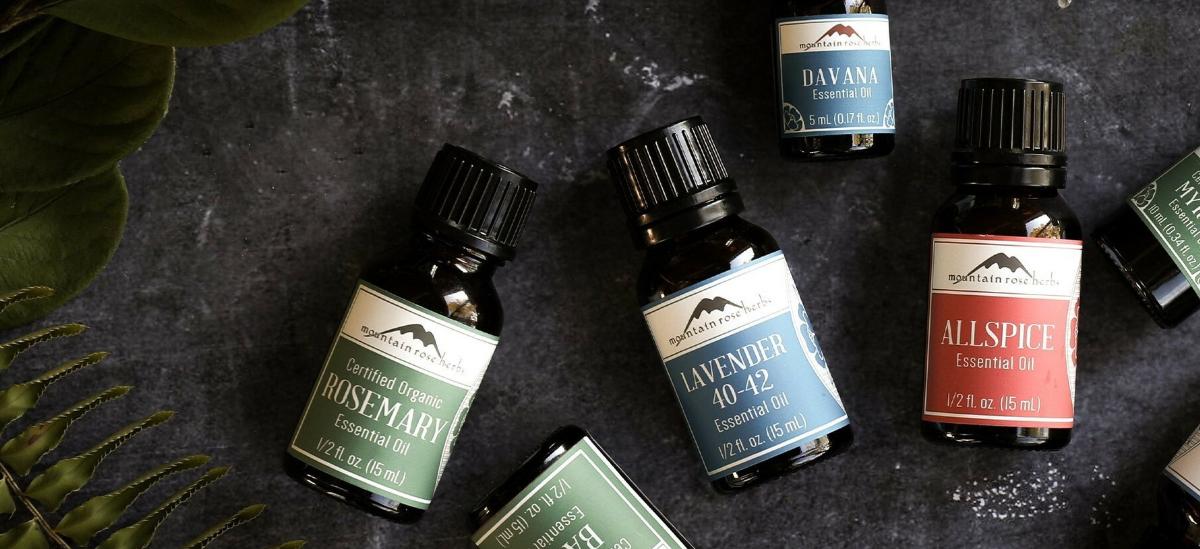
Mountain Rose Herbs epitomizes dedication to sustainability and ethical sourcing in the essential oils market. With a focus on organic agriculture, zero waste practices, and environmental restoration initiatives, they not only offer high-quality products but also actively contribute to a healthier planet and community.
- Sourcing and Ingredients: Organic, responsibly sourced ingredients; wild-harvested botanicals.
- Production and Manufacturing: Sustainable sourcing and high-quality essential oils.
- Packaging and Distribution: Zero Waste policy; TRUE Zero Waste facility Platinum certification.
- Corporate Responsibility: Environmental restoration projects; community support.
- Certifications: Recognized as a sustainable workplace; emphasis on fair trade practices.
4. Bursera

Bursera is a standout in the aromatherapy market for its commitment to the planet, demonstrated by its tree planting efforts and carbon neutrality. Using 100% post-consumer, recyclable materials and supporting global environmental initiatives, Bursera offers a holistic approach to sustainability in every aspect of its business.
- Sourcing and Ingredients: Ethical sourcing; commitment to sustainability.
- Production and Manufacturing: Eco-friendly practices.
- Packaging and Distribution: 100% post-consumer, recyclable, and biodegradable packaging; soy inks.
- Corporate Responsibility: Tree planting initiatives; partnership with Trees for the Future.
- Certifications: Carbon-neutral company; 1% for the Planet member.
5. RE Botanicals
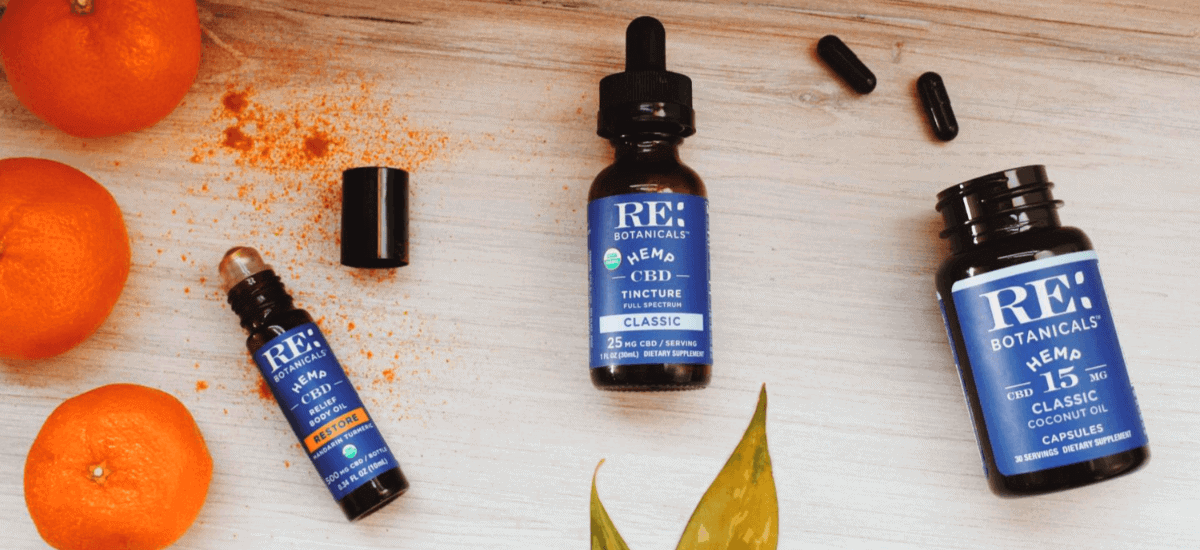
RE Botanicals, the first to offer U.S.-grown, USDA-certified organic hemp, is at the forefront of the hemp product market. Their dedication to regenerative farming and organic ingredients, coupled with a commitment to supporting farmer education and sustainable practices, showcases a harmonious blend of quality and environmental stewardship.
- Sourcing and Ingredients: USDA-certified organic hemp; non-GMO; pesticide-free.
- Production and Manufacturing: Organic cane alcohol extraction; small batch production.
- Corporate Responsibility: Focus on regenerative agriculture; 1% sales donation for farmer education.
- Certifications: First national CBD brand with USDA organic certification.
6. Thrive Market
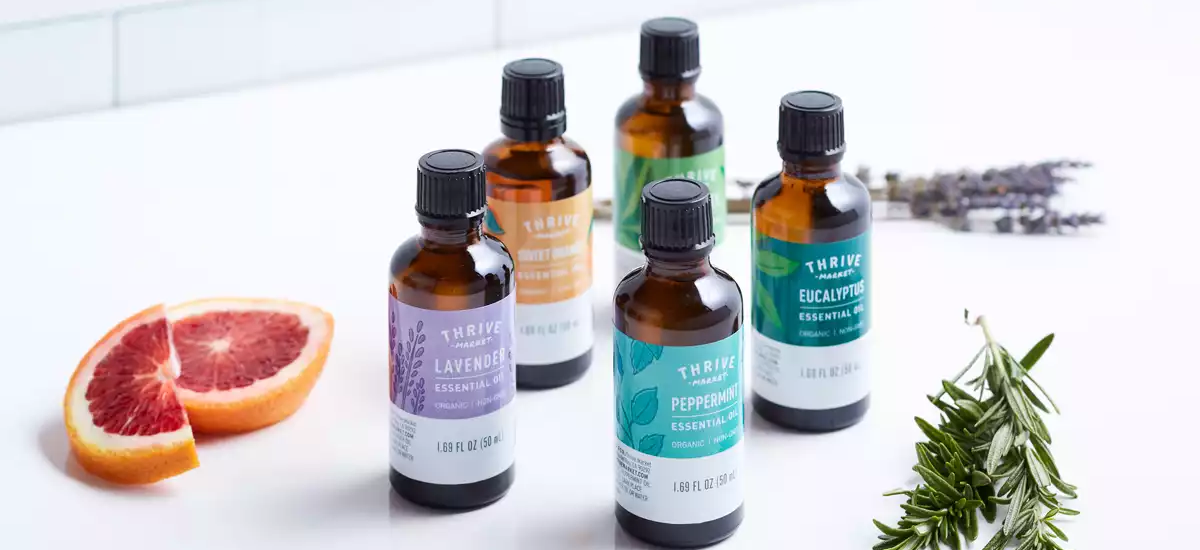
Thrive Market’s essential oil range is a reflection of their broader commitment to sustainability and environmental responsibility. As a B Corp and TRUE Certified Zero Waste company, they emphasize ethically sourced, regeneratively grown ingredients and maintain a climate-positive production process, embodying a future-forward approach to sustainable living.
- Sourcing and Ingredients: Organic, non-GMO essential oils; fair labor practices.
- Production and Manufacturing: Climate Neutral Certification; carbon emissions offset.
- Packaging and Distribution: Reduced plastic usage; TRUE Certified Zero Waste.
- Corporate Responsibility: Committed to ethical business practices; supports community well-being through sustainable agriculture and fair labor practices.
- Certifications: B Corp certified for high social and environmental standards.
7. Aromatherapy Associates
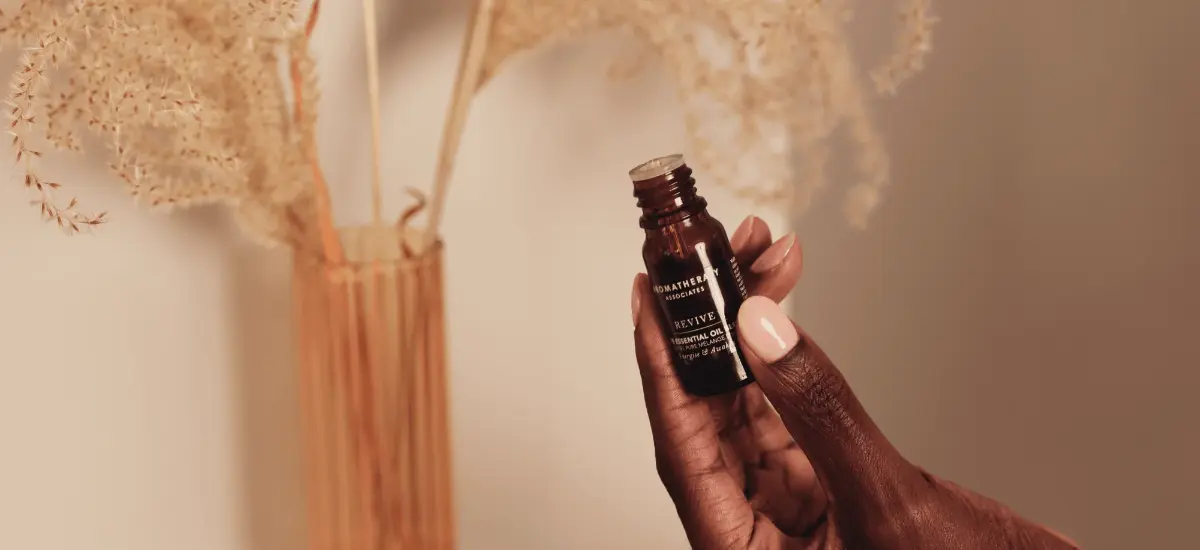
As a champion of therapeutic aromatherapy, Aromatherapy Associates excels in delivering high-quality, hand-crafted essential oil blends. Their B Corp certification and cruelty-free Leaping Bunny status reflect a profound dedication to wellbeing, ethical standards, and environmental mindfulness, making their products a testament to sustainable luxury.
- Sourcing and Ingredients: High-quality, natural essential oil blends; hand-crafted products.
- Production and Manufacturing: Headquarters uses 100% renewable energy. All retail cartons use paper from 100% sustainable forests (FSC certified). Removed over 1.5 tonnes of virgin plastic from products in 2020. Products are free from harmful chemicals.
- Packaging and Distribution: Fully recyclable and, where possible, reusable packaging.
- Corporate Responsibility: B Corp certification; Leaping Bunny status for cruelty-free products.
- Certifications: B Corp certified; Leaping Bunny approved.
8. doTERRA
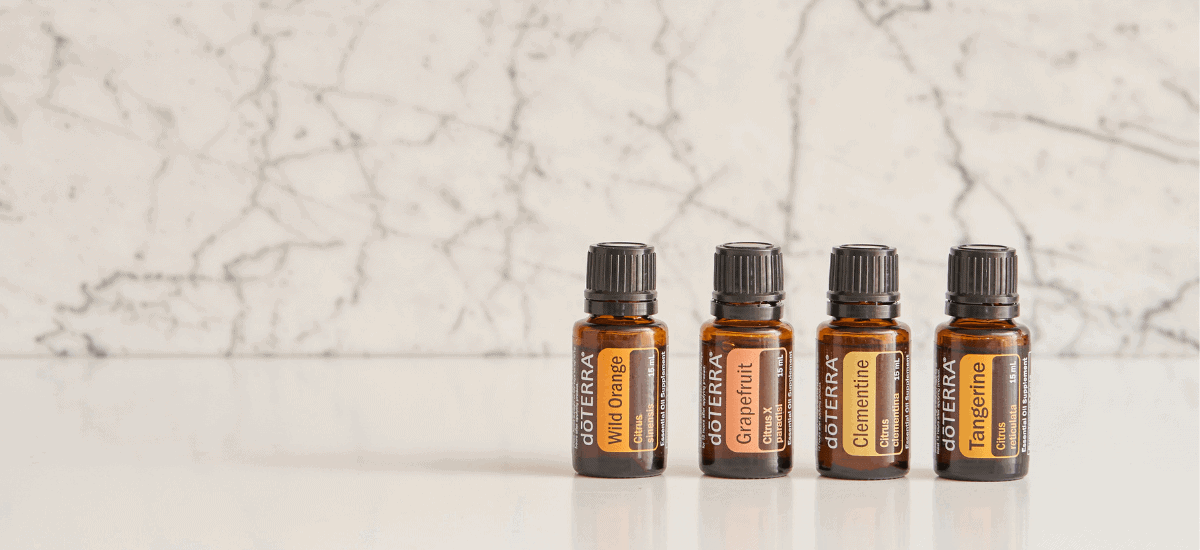
doTERRA, synonymous with “Gift of the Earth,” upholds its name through ethical sourcing and community-focused Co-Impact Sourcing. The brand blends quality and purity in its essential oils with a strong commitment to environmental and social impact.
- Sourcing and Ingredients: Co-Impact Sourcing; ethical and fair supplier practices. Utilizes sustainable Black Spruce, Frankincense, and Douglas Fir.
- Production and Manufacturing: Collaborates with local growers; eco-friendly practices including paper fillers, recycled inserts, and soy-based inks.
- Packaging and Distribution: Sustainable forestry for shipping boxes; encourages bottle recycling/upcycling.
- Corporate Responsibility: Focuses on health, well-being, and community support; includes electric vehicle charging and convention material donations.
- Environmental Initiatives: Actively reduces carbon footprint and waste; innovative, sustainable harvesting and distillation methods.
- Certifications: CPTG Certified Pure Tested Grade®, with rigorous testing methods including Organoleptic, Microbial, Gas Chromatography, Mass Spectrometry, FTIR, Chirality, Isotopic Analysis, and Heavy Metal Testing.
9. Appalachian Botanical Co.
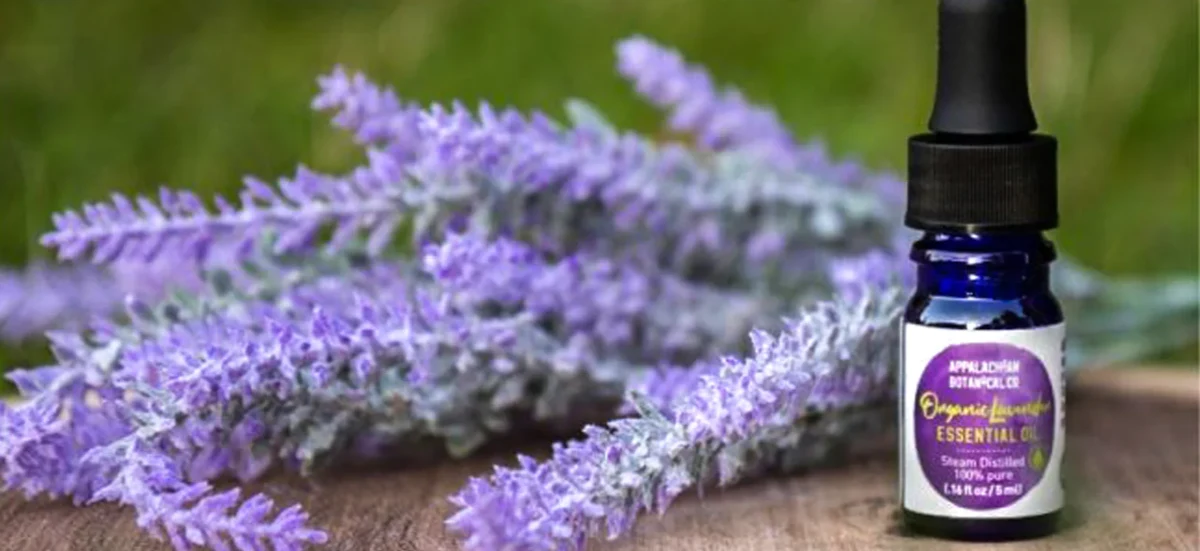
Innovatively transforming post-coal mine lands into productive lavender fields, Appalachian Botanical Co. is a remarkable example of sustainable agriculture and community empowerment. Their approach not only revitalizes land but also provides high-quality, organic lavender products, embodying a true spirit of environmental and social responsibility.
- Sourcing and Ingredients: Lavandula Angustifolia and Lavandula x intermedia varieties, minimal water or fertilizer use.
- Production and Manufacturing: Steam distillation; sustainable harvesting practices; lavender farming on reclaimed coal mine land.
- Packaging and Distribution: Zero-waste approach; repurposes all plant parts; uses lavender hydrosol and composts plant ‘mash’.
- Corporate Responsibility: Maximizes use of each lavender plant; closed-loop system in plant processing.
Sustainable Essential Oil Companies Comparison
| Brand Name | Key Ingredients | Certifications | Environmental Initiatives | Social Responsibility | Unique Selling Points |
|---|---|---|---|---|---|
| Neal’s Yard Remedies | 92% organic | Soil Association, CarbonNeutral®, Leaping Bunny | Renewable energy, aims for recycled bottles by 2025 | First with 100/100 ethics score by Ethical Company Organization | Renewable energy-powered eco-factory, sustainable packaging |
| Vitruvi | 100% natural, vegan, cruelty-free | Leaping Bunny | Recycled glass bottles | Donations to farming and health programs | Global sourcing, clean standards |
| Mountain Rose Herbs | Organic, wild-harvested | TRUE Zero Waste Platinum, fair trade | Zero Waste policy | Environmental restoration projects | Emphasis on organic agriculture, zero waste practices |
| Bursera | Ethical | Carbon-neutral, 1% for the Planet | Tree planting, 100% post-consumer packaging | Trees for the Future partnership | Tree planting initiatives, biodegradable packaging |
| RE Botanicals | USDA-certified organic hemp | USDA organic | Regenerative farming | Donations for farmer education | First with USDA-certified organic hemp |
| Thrive Market | Organic, non-GMO | B Corp, TRUE Certified Zero Waste | Climate Neutral Certification, reduced plastic usage | Ethical business practices | Climate-positive production, Zero Waste |
| Aromatherapy Associates | High-quality natural blends | B Corp, Leaping Bunny | 100% renewable energy, FSC certified paper, reduced plastic usage, chemical-free products | Cruelty-free | Therapeutic aromatherapy, hand-crafted blends |
| doTERRA | Ethical, Co-Impact Sourcing | CPTG Certified Pure Tested Grade® | Eco-friendly practices; reduced fuel in logistics; recycled packaging and inserts; soy-based inks | Health, well-being, community support; convention material donations; electric vehicle charging | Ethical sourcing, community focus; innovative environmental initiatives |
| Appalachian Botanical Co. | Organic lavender | Unknown | Utilizes reclaimed coal mine lands | Employment opportunities | Transforming post-coal mine lands |
Comparisons of ingredient sourcing, certifications, environmental initiatives, social responsibility and unique selling points for each sustainable essential oil brand.
What makes an essential oil brand sustainable?
A sustainable essential oil brand focuses on several key factors: ethical sourcing of ingredients, often choosing organic, non-GMO, or wild-harvested plants; environmentally friendly production processes that minimize energy consumption and waste; and responsible, often recyclable or biodegradable, packaging.
These brands may also support community initiatives, ensure fair labor practices, and adhere to cruelty-free standards.
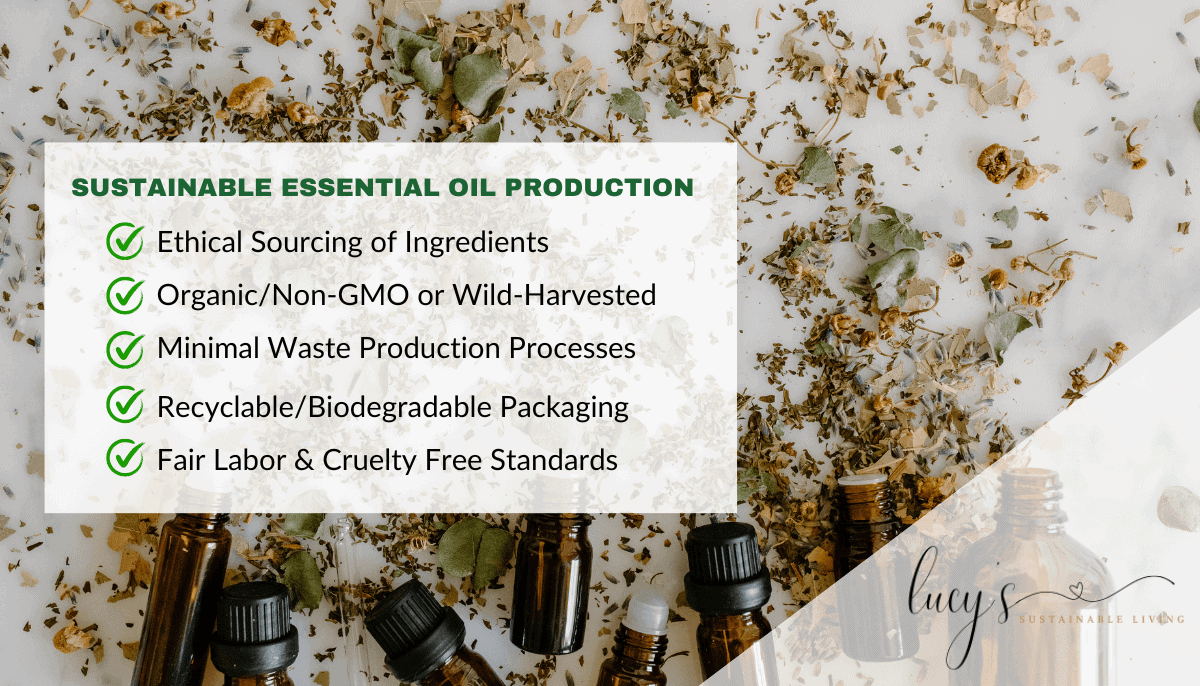
What are some common sustainable practices in essential oil production?
Sustainable practices in essential oil production include using renewable energy sources in manufacturing processes, implementing water conservation methods, and practicing regenerative agriculture to maintain soil health.
Brands may also utilize ethical sourcing methods, ensuring that raw materials are harvested responsibly and that local communities are supported.
Reducing waste throughout the production process and using eco-friendly packaging materials are also key sustainable practices.
What are the best ways to use essential oils sustainably at home?
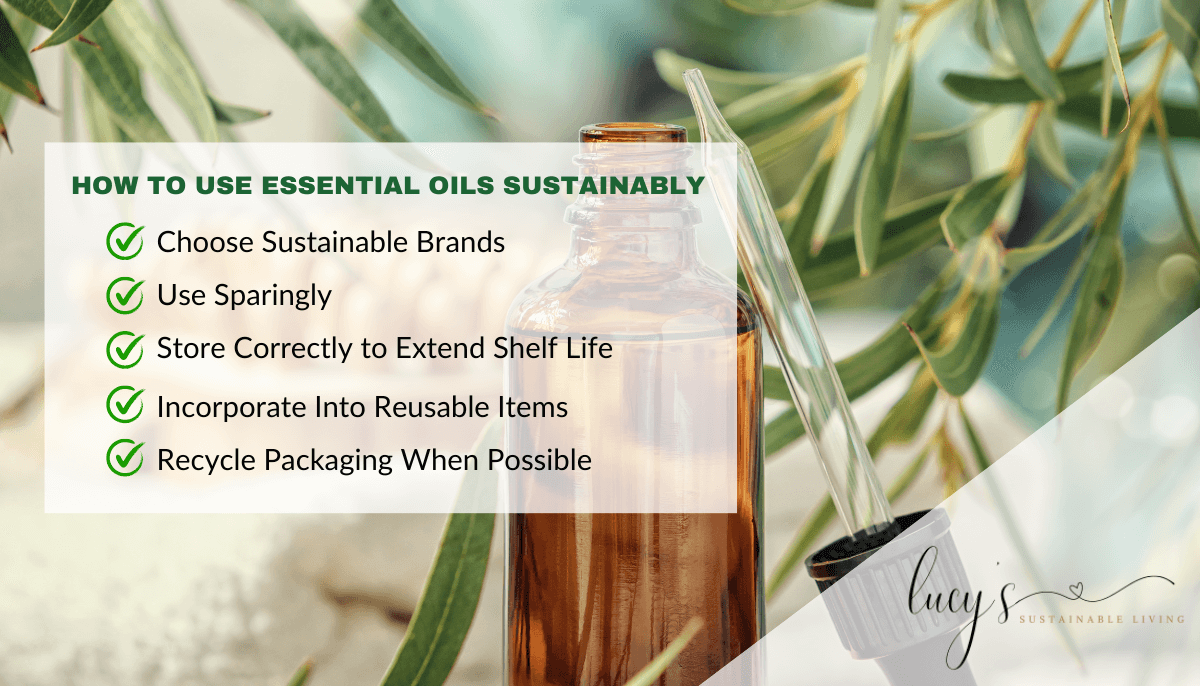
To use essential oils sustainably at home, start by purchasing oils from sustainable brands.
Use oils sparingly as a little goes a long way. Properly store essential oils in a cool, dark place to extend their shelf life.
Incorporate oils into reusable items like diffusers instead of single-use products.
Finally, when disposing of empty bottles, ensure they are recycled according to local recycling guidelines.
Every Drop Counts!
By choosing sustainable essential oil brands, you contribute to a healthier planet and a more ethical industry.
Remember, every drop counts in our collective effort to preserve the environment.
f you want to support brands that have committed to rigorous standards of social and environmental performance, accountability, and transparency, delve into the world of B Corp certification.
Learn more about these trailblazers in sustainable business by reading our article on B Corp brands, where we showcase companies leading the charge in corporate responsibility.

